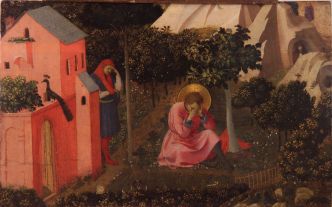Well, I wanted to start off this blog with a disclaimer noting that I am a historian, not a political scientist. I have noticed many different opinions on the social, cultural, and media phenomenon that is Donald Trump’s rise to the forefront of the Republican Primary discussions. Trump has taken numerous victories around the country, including a thorough domination in the states in the Deep South. Since today has numerous high-profile primaries and one caucus, I wanted to blog about Donald Trump, Emperor Constantine, and the ability of religion to be used as a political tool.
There has been no shortage of blog posts, articles, and probably even forthcoming books detailing Donald Trump’s ascendancy in polls and in voter turnouts. There have been those who have shared memes joking about his unorthodox campaign, those who have questioned his true loyalties, and even a trending hashtag of #NeverTrump. Others have called into question whether or not he is a real Christian, as he claims to be. There was even a mini-controversy over him saying “Two Corinthians” in quoting a Bible verse (many people did not realize it, but many Christians refer to 2nd Corinthians this way). I wanted to delve into the theory that Trump has used Christianity as a tool to gain the support of much of the Religious Right. Such a theory reminds me of some interpretations of Emperor Constantine.
Constantine (272-337 CE) was the first true Christian emperor. He converted to Christianity after seeing a vision of the cross before riding into battle. He parlayed its image onto his shields and eventually was victorious at the Battle of Milvian Bridge in 312. The Edict of Toleration was issued in 311, which ended the persecution of Christianity, and the Edict of Milan in 313 legalized Christianity as a religion in the Roman Empire. Constantine was only baptized on his deathbed, leading to many scholars over the years to question the authenticity of his conversion. Some have argued that Christianity was a political tool to unify the empire under Constantine’s rule, firming up his status as the sole ruler of the Roman world.
Eusebius of Caesarea wrote his Ecclesiastical History and a Life of Constantine, the latter of which was a glowing, hagiographical work which praised Constantine’s virtues and cast him in the role of a saint. For Eusebius, Constantine was completely sincere in his faith, and even ushered in the millennial kingdom on earth. For some modern scholars, Constantine was a shrewd politician who used Christianity. Which is it?
The current consensus is that Constantine definitely made a political move in making Christianity the official religion of the Roman Empire. However, most scholars now either believe he might have been sincere, or at least that he could have been sincere but there is just no way to truly know. Unfortunately, we simply have to study Constantine’s actions from the perspective that he might have been a genuine Christian or that he might have just used Christianity’s popularity to his advantage. Either way, the effect was that Rome was Christianized and Constantine was a main cause of it.
This brings us back to Trump. Is he a true Christian? Is he using Christianity to manipulate voters into thinking he’s their Religious Right champion? Maybe Donald Trump is actually a Christian who is using Christianity to his political advantage. He would hardly be the first politician, or potential president, to do so. Unlike Constantine, however, Trump is alive and we can scrutinize his actions and decisions and speeches to determine to what extent he is using Christianity as a political tool.
Where does this leave us? Should we give Constantine the benefit of the doubt? How about Trump? I think that both can teach us that religion can be a political tool. It has been in the past and most likely will continue to be into the future. Voters need to realize this and make informed, intelligent decisions on whom to vote for. What do you think? Do you agree? Should we allow for the possibility that religion is just a tool for politicians sometimes? Does that make them less of a Christian (or other religious follower)?











